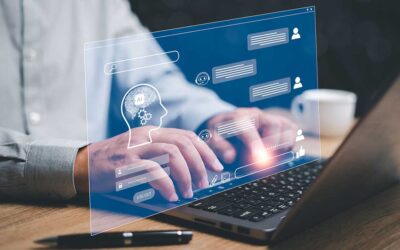Examples of Artificial Intelligence
Lauren Hays
Earlier, I wrote a post about artificial intelligence in libraries to give an idea of how artificial intelligence is used now and how it may be used in libraries in the future. In this post, I will share examples of artificial intelligence that can be found on the open web.
These sites are all relevant to the work we do in libraries as they showcase how AI can create images from words, scan books, and anticipate phrases. As you experiment with each of these, I hope you consider how this type of technology may change how information is created, located, preserved, and stored in the future.
- Talk to Books: from Google, this site lets you “browse passages from books using experimental AI.” It works by having you “type in a question or a statement.” Then “the model looks at every sentence in over 100,000 books to find the responses that would most likely come next in a conversation. The response sentence is shown in bold, along with some of the text that appeared next to the sentence for context.”
- Generative Engine: “A storytelling machine that automatically generates synthetic images as you write new words and sentences.”
- Quick Draw: this is similar to the game Pictionary, where the user draws an image and the AI, created by Google, tries to guess what it is.
- Image-to-Image Demo: it creates images out of simple line drawings.
- Semantris: “Semantris is a set of word association games powered by machine learning. By training the billions of conversations on the internet, the AI has learned how to predict which words, phrases, and even sentences might come next in a conversation.”
- AutoDraw: “It pairs machine learning with drawings from talented artists to help everyone create anything visual, fast.”
Some of the projects above are from Google. Google also has a site that is dedicated to AI Experiments where you can explore many other AI projects.
Google Experiments: “AI Experiments is a showcase for simple experiments that make it easier for anyone to start exploring machine learning, through pictures, drawings, language, music, and more.”
Again, as you explore each of these tools, I hope you take time to pause and reflect about how far this technology has come and how quickly it may evolve. There is a great deal of potential seen in these fairly simple examples.
*You may also be interested in checking out other experiments Google has posted. They have experiments in extended reality for the web, arts and culture, Chrome, experiments for learning, and a section titled Start with One which is “a collection of experiments that started by working with one person to make something impactful for them and their community.”
Lauren Hays
Lauren Hays, PhD, is an Assistant Professor of Instructional Technology at the University of Central Missouri, and a frequent presenter on topics related to libraries and librarianship. Her expertise includes information literacy, educational technology, and library and information science education. Please read Lauren’s other posts relevant to special librarians. And take a look at Lucidea’s powerful integrated library systems, SydneyEnterprise, and GeniePlus used daily by innovative special librarians in libraries of all types, sizes and budgets.
Never miss another post. Subscribe today!
Similar Posts
End-of-Calendar-Year Reflections for School Librarians
The end of the calendar year offers school librarians a chance to reflect on what’s working, make thoughtful adjustments, and plan for the year ahead.
Library Instruction: Learning Styles Are Out, Evidence-Based Practices Are In
For instructors and educators of all types, it’s vital to realize that evidence-based practices are more effective than catering to the myth of learning styles.
Interview with Susan Walsh:
Dirty Data, AI, and the 2nd Edition of “Between the Spreadsheets”
Author Susan Walsh discusses the new edition of “Between the Spreadsheets,” sharing insights on fixing dirty data, AI’s impact, and her COAT framework.
Interview with the Author:
Dr. Kate McDowell on Storytelling for Libraries
Dr. Kate McDowell shares how data storytelling helps libraries advocate, counter misinformation, and build trust for future generations.




Leave a Comment
Comments are reviewed and must adhere to our comments policy.
0 Comments